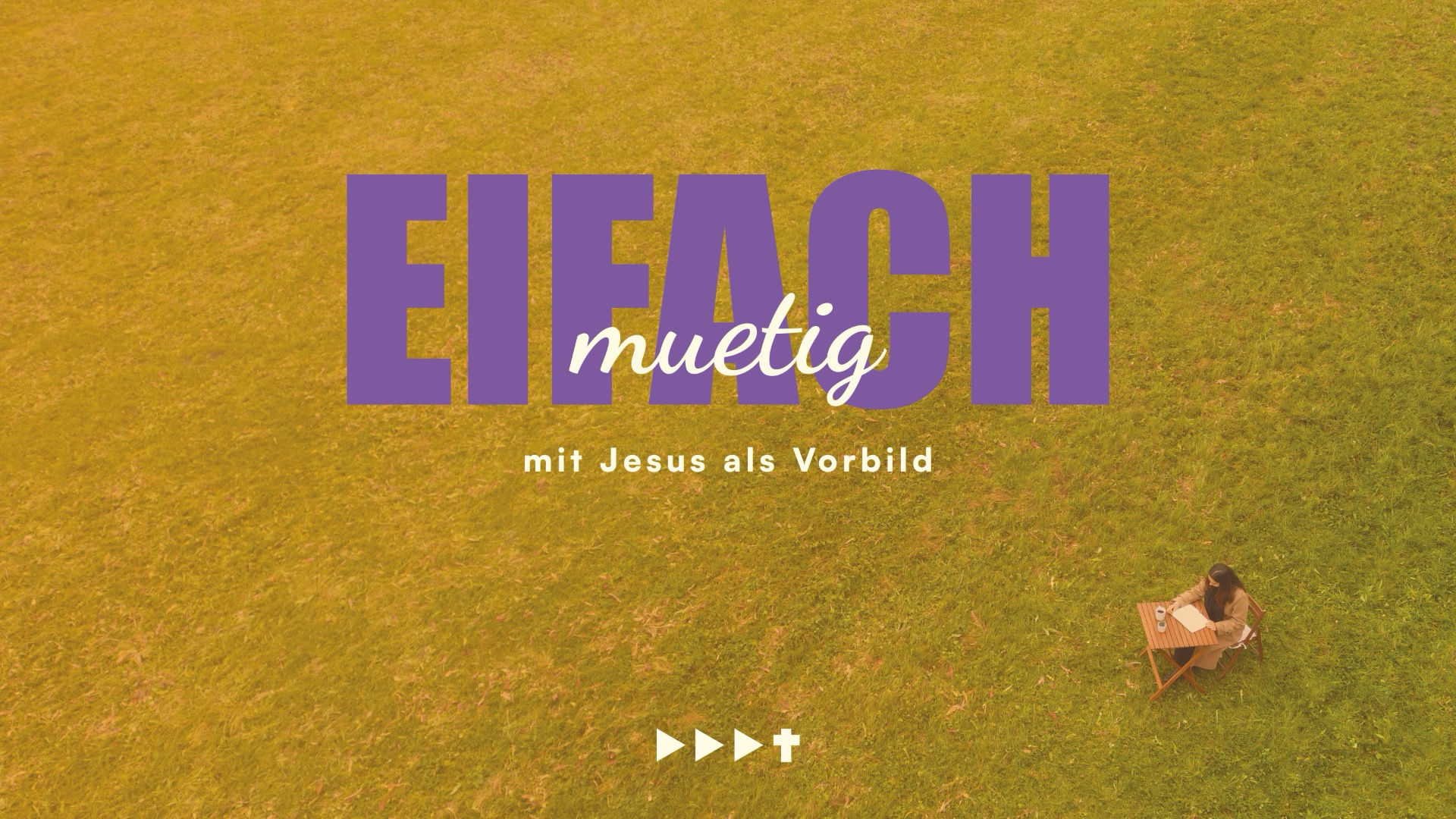Hospitality in the house of God
Series: Welcome home | Bible text: Luke 15:11–24
This sermon connects the annual theme «Welcome Home» with a current challenge in congregational life that we are facing. Namely, we ask ourselves how, inspired by the hospitality in God’s house, we can derive a comprehensive welcoming culture for the seetal chile. In this endeavour, we find strong impulses in the parable of the father with the two lost sons.
Every January we hold a so-called vision service. These services are meant to open our eyes to the future. We talk about what spiritual meaning the theme of the year could have for our concrete congregational life. Specifically, today we want to look at hospitality in the house of God and draw conclusions for ourselves. Jesus paints this before our eyes very impressively in the parable of the father with the two sons.
Welcome culture in God’s house
Jesus continued: «A man had two sons. The younger son said to his father: «I want my inheritance from your property already now».» (Luke 15:11,12). He could just as well have said: «I wish you were dead.«Because you normally only get the inheritance after the death of the father. This son could not wait. With the money in his pocket, the younger son completely turned his back on his previous life. Jesus here paints us a picture of the worst possible behaviour that was possible in the culture of that time. The son had treated his father disrespectfully. His deeds were not trifles. He was an adulterer and spent the money on prostitutes. When there was no money left, he even sank so low as to take a job as a pig herder. Pigs were the epitome of impurity for Jews.
Jesus could not add anything that would make the son worse off. The younger son is fully aware that he has messed up. That is why he wants to go back to his father. He does not expect to be welcomed as a son. He was just hoping for a job as a day labourer. «So he returned home to his father. He was still far away when his father saw him coming. Full of love and compassion, he ran to meet his son, embraced him and kissed him.» (20). The father ran to meet him. That’s not what a rich man did in those days. But love was stronger than social norms.
«His son said to him: «Father, I have sinned, against heaven and also against you, and am no longer worthy to be called your son».» (21). A saying learned by heart (17ff). There is some truth in this thought. It is true that his actions were unworthy of a son. But let us look at the father’s reaction: it seems as if he does not even hear the rehearsed apology. The father knew what was going on in his son’s heart. He felt that he was sorry. Nothing else mattered.
«But his father said to the servants, «Quick! Bring the best clothes in the house and put them on him. Get a ring for his finger and sandals for his feet. And slaughter the calf we fattened in the stable.» (22+23). The calf, incidentally, is the only character for whom this story ends badly! «Because my son here was dead and has come back to life. He was lost, but now he is found again. And a celebration of joy began» (24).
The three gifts are of great importance:
A robe – relationship restored
This was not a dirty, used robe, but the best robe in the whole house. Perhaps it even belonged to the father himself. It symbolises that the son has been restored to the position and all the rights of a son. The father never stopped loving him. But now he was also completely restored. The robe also symbolises the covering of the son’s shame.
One Ring – Power of Attorney Restored
It must have been some kind of signet ring, like the ones used on official documents. Everyone knew that it was a sign of his father. Without this seal, instructions on a document had no binding authority. So the ring is a symbol of power and authority to carry out business on behalf of the father. This boy, who had squandered his father’s wealth, was put back into service, so to speak, and was again allowed to conduct business in the name of the father. He had access to all the information. What a vote of confidence. He was allowed to give orders again and everyone had to obey him because of the ring on his finger.
Sandals – Position in the family restored
Thirdly, he asked the servants to bring him sandals. In a Jewish household, only the father and the sons were allowed to wear sandals. So the father has made it unmistakably clear that this boy – regardless of his deeds – is still his son. With all the rights that go with it.
Welcome culture in the seetal chile
This example of hospitality in the house of God should inspire us as seetal chile. The local church should represent the house of God on this earth. Hospitality is a divine quality that we are to live. It is striking that it is mentioned as a criterion for elders. «An elder must be a person who leads an impeccable life. He should be faithful to his wife. He should have self-control, live prudently and have a good reputation. He should be hospitable and able to teach others»(1 Timothy 3:2; cf. Titus 1:8). The people of the church leadership should also go ahead in this matter and set an example. But being a host is not only a leadership task, as we will see in a moment.
The following four steps are stages in our welcoming culture:
1. initial contact
Like the father in the parable, we want to approach new people proactively but tactfully. (I don’t think we should kiss them.) We also want to be proactive by inviting people. The business cards printed on the theme of the year and available at the exit can also serve this purpose. Who could you invite to the house of God, which is the church, this year?
The son returned empty-handed and with a damaged reputation. The Father accepted him unconditionally and let him experience His beneficent grace. There was no pressure, no expectations, only acceptance and forgiveness. Unfortunately, we Christians are not necessarily known for these qualities, but rather for critical scrutiny and judgement or even condemnation. A single woman gave up her body to men in exchange for payment to get her child over the hump. To be less exposed to pain, she took mind-altering drugs. When told that she should go to the church for help, she said: «I already feel bad. I don’t want to feel worse.» I dream of a church where people walk directly into the arms of God’s beneficent and inviting grace represented by people. Wouldn’t it be nice if we were known for extraordinary empathy!
On our website you will find the words «belong, believe, behave». People should immediately belong. Through the experience of unconditional acceptance they become open to faith in Jesus Christ. And only then – through the power of the Holy Spirit – are they changed in their behaviour. God reaches the goal with every human being – also with me.
Just as the Father covered the shame of the Son with the robe, we are very concerned that people are never exposed here. That is why there are no open prayer sessions and no forced saying hello to each other.
2. create contacts
In a second step, new people should be able to network. The father in the parable immediately had a calf slaughtered and threw a feast. A party is a great way to build relationships in a pleasant setting. Recently I heard a pastor say that participation in a church retreat replaces three years of ’normal» church life in terms of creating contacts. We are always trying to find spaces where people can easily build relationships. This can be at the thanksgiving festival, on the Israel trip, during the Chrischona holidays or every Sunday in the bistro. To make it a little easier to connect there, we want to create a corner where people can come.
Symbolised by the sandals, the son’s position in the family was restored. He was completely part of the family again and therefore also had access to all the information. It has been pointed out to us that it is still too difficult to get the information. We want to improve that.
Become part 3
Through the ring that was put on the son’s finger, his authority was restored. He was allowed to conduct business and give orders in the name of the father. This gave him power to make a difference. People become part of a Christian community when they are allowed to live their calling and use their passion. We want to help people to make a difference in the seetal chile. Because then something really nice happens: they no longer talk about «you», but about «we». They leave the observer status and become part of the community. An identification happens. And those who identify themselves criticise in an uplifting way and work for improvements themselves. Together we invest ourselves for a cause greater than ourselves. This phase begins the process of turning a guest into a host who welcomes people and makes them feel welcome.
The role of the church service is also changing. Until now, it was an indispensable recharging station. But now you begin to get the feeling that you have slowly but surely seen it. This is a good sign, because now it is time to prepare for the next phase. The change from consumer to host must now take place.
4. become a father
Henry Nouwen writes in his excellent book «Take His Image into Your Heart» that the goal of a son should always be to become a father himself who makes God’s grace tangible for other people. A father puts his own needs and preferences in the background in favour of «homecomers» in a wonderful selflessness. To him, the home atmosphere is more important than his own needs because he has found the source of true life. He rests in himself because he has become completely at home with the heavenly Father. Are you already a father looking out for homeless people? We urgently need spiritual mothers and fathers in seetal chile to be able to deal well with the growth God has given us. Merely stating that new people come and others leave is unworthy of a father. Being a father or mother requires spiritual maturity. We want to be challenged to take steps of growth during the year.
The 95-year-old Pablo Casals, considered the greatest cellist the world has ever seen, had an exemplary attitude. A young reporter asked him one day: «You are 95. You are considered the best cellist in the world and yet you still practise six hours a day. Why?«To which the latter replied: «Because I think I’m making progress.» We have not yet reached the goal and should make progress every day. This is how we become mature in Christ.
Willcomeen dahome! As a whole congregation, we want to take a big step forward in this topic this year – and not only with the adults, but also with the children. Therefore, a project has been started within the visionary leadership where these four points will be dealt with intensively. The idea is that we will hold a community forum on the topic in due course.
Because Jesus Christ left his home and came to earth as a stranger, we can find a home with the heavenly Father. We are allowed to come empty-handed, are warmly welcomed and are allowed to become more and more at home. That is grace! This grace should become a personal experience for ourselves and new people in the seetal chile.
Possible questions for the small groups
Read the Bible text: Luke 15:11–24
- How do you rate the welcoming culture of seetal chile and where do you see room for improvement?
- Which of the four stages do you feel you are in? What would it take to reach the next one?
- Have you been able to develop deep relationships? Which vessels have been helpful?
- Do you see yourself as a guest or a host in seetal chile? What is the impact of one or the other?
- Do you know the feeling that the services no longer have the same relevance for your spiritual life? What could this mean for your heart attitude?
- Using the imagery of the parable, how might one describe God’s grace?





